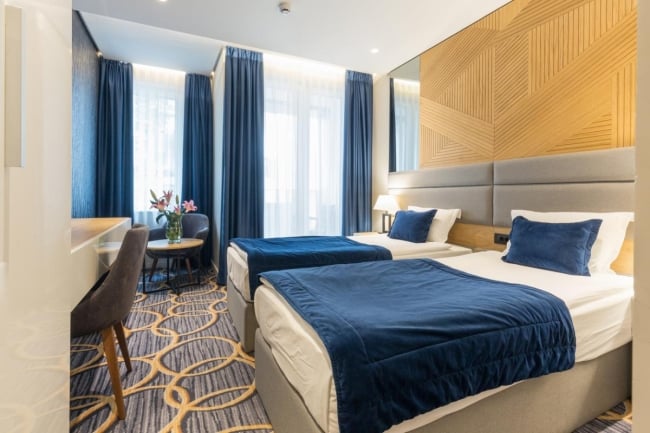You have /5 articles left.
Sign up for a free account or log in.

istock.com/rilueda
In an effort to reduce on-campus housing density, colleges are leasing apartments and hotel rooms to house students this fall. The arrangements are an added cost for colleges when budgets are already tight, but the rooms come at no additional expense for students and will hopefully reduce coronavirus spread on campus.
In Boston, Northeastern University will lease rooms at the Westin Copley Place, the Midtown Hotel and a handful of nearby apartment buildings.
“We understand that lowering density is going to help us keep everybody safe and healthy and have a successful academic year,” said Kathy Spiegelman, vice president and chief of campus planning and development at Northeastern. She was originally tasked to find 2,000 additional beds, though that target shrank after the university decided students could still have one roommate.
Northeastern is renting out some meeting rooms at the Westin to use as classrooms for afternoon and evening seminars. The university will also install laundry facilities in the hotels and conduct mail service.
The university will “master lease” the apartment buildings, Spiegelman said. Instead of having students find and sign their own leases, Northeastern will lease collections of units, and students will pay the university a housing fee.
Loyola University in Maryland has also tapped two nearby apartment buildings to house students in the fall. A portion of the two buildings will be home to about 400 students, said Terry Sawyer, senior vice president of advancement at Loyola.
“We started with the premise that we wanted to create a campus infrastructure that adhered to good public health recommendations but also allowed students that wanted to return for an on-campus experience to be able to do so,” Sawyer said. Like at Northeastern, no student will have more than one roommate.
Earlier in the planning process, Sawyer expected more students to opt out of campus housing and complete their online coursework from elsewhere. As more students reported their plans for the fall, the university realized it would need more beds.
“Some students have already told us, ‘Thank you, but we’re just going to stay home and take classes online,’ which is fine, that also helps us reduce density,” Sawyer said. “But not that many. We only have right now 130 students out of 4,000 undergrads that have elected to be entirely online.”
Brown University has signed leases at four nearby apartment buildings. Suffolk University, also in Boston, has rented 473 rooms at downtown hotels Hyatt Centric, the Wyndham Beacon Hill, the DoubleTree Downtown and the Boxer.
“Contracting with hotels allows us to provide safe and accessible housing within a short walk from campus buildings. Students will be in private bedrooms with private in-room bathrooms and will have similar amenities to those living on campus, including wi-fi connectivity and close proximity to other students, campus buildings and access to dining services,” Greg Gatlin, vice president of communications at Suffolk, wrote in an email. “We know that this also comes as a boost to Boston hotels at a time when many could use the business.”
Northeastern also needed to free up on-campus housing for mandatory quarantine when students test positive or otherwise need to self-isolate.
“It also allowed us to leave a good number of rooms open on campus for what we call the ‘wellness beds,’ anticipating that there will be students in the course of the semester or the year that will either test positive or contact tracing will identify that they should be quarantined,” Spiegelman said.
Sawyer said the arrangements were a “significant cost” for Loyola. None of the universities contacted would disclose exactly how much they are spending on the rooms. At all of them, students will not be charged more than on-campus, university-owned housing rates.
At Suffolk, that rate is $7,280 per semester.
“We are subsidizing the cost so that students will be charged the same amount they would be if they were living in one of our own residence halls,” Gatlin wrote. “And all students, whether in one of our residence halls or in a hotel, are being charged a double room rate even though they will all be living in singles.”
Spiegelman mentioned that the success of the added rooms hinges on good rollout of the university's testing plans, widespread mask wearing and contact tracing.
“None of these things will be sufficient in isolation, but together -- particularly the robust testing and contact tracing -- we’re very optimistic that we’ll have a good year for the students,” she said.








